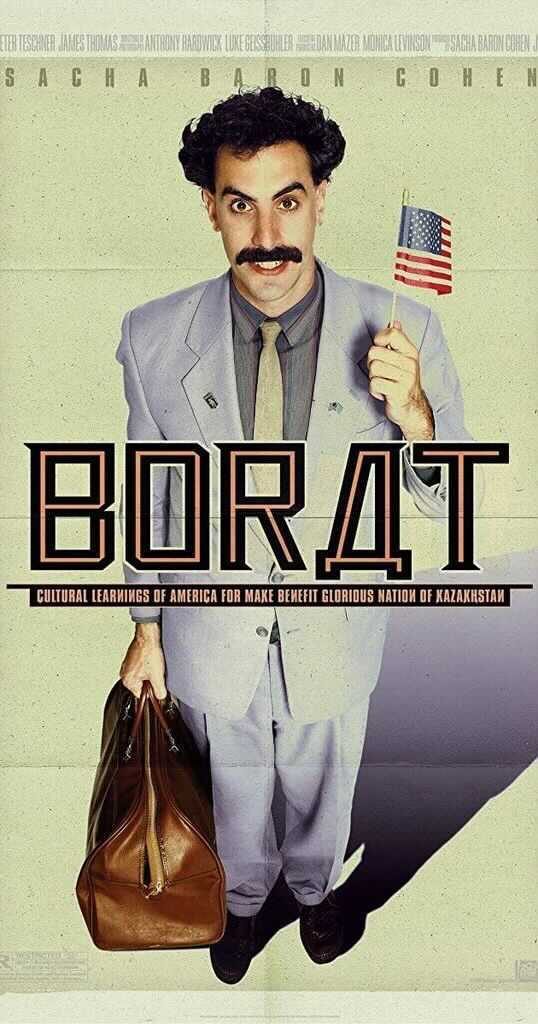“Borat Subsequent Moviefilm: Delivery of Prodigious Bribe to American Regime for Make Benefit Once Glorious Nation of Kazakhstan,” was released Oct. 23 as a sequel to “Borat: Cultural Learnings of America for Make Benefit Glorious Nation of Kazakhstan” in 2006. The controversial mockumentary comes with 1 hour and 36 minutes of laughter, awkward silences and gasps. Sacha Baron Cohen plays Borat Sagdiyev, a satirical fictional character who is a Kazakh television journalist with outrageous social views. Borat’s overtly misogynist and anti-Semitic character makes inappropriate statements throughout the film, mocking mainstream conservative ideology.
The film depicts Borat making a return to the United States to redeem Kazakhstan, after his first documentary brought shame to the country. He is ordered by the Premier Nursultan Nazarbayev, played by Dani Popescu, to give away the nation’s Minister of Culture, Johnny the Monkey, to President Donald Trump. The plans are interrupted when Borat’s 15-year-old daughter, Tutar, played by Maria Bakalova, arrives in a shipment containing the remains of Johnny the Monkey. Blood is smeared on the corners of Tutar’s mouth and it is obvious to audience members that Tutar ate Johnny. Borat then volunteers his daughter to be given as a gift to Mike Pence. The two travel around the United States and meet individuals who help shape Tutar into the “ideal woman.”
Throughout the film, Cohen uses his disguise as Borat to trick conservative politicians, Christian anti-abortionist counselors, priests and other influencers into being filmed while making controversial statements or behaving inappropriately. The film includes a scene where Tutar is advised by a “sugar baby” played by Instagram influencer and actress Macy Chanel May on how to attract rich men. Business Insider reported that May felt uncomfortable with filming this scene and she described Cohen as “a gifted manipulator.”
Others appearing on-screen described feeling “tricked” by Cohen, including Jeanise Jones, who thought she was being recruited by her church, Ebenezer Missionary Baptist Church, to help mentor teenager Tutar. However, Jones stated that her role in the film could have given better compensation, as a part of Jones’ role included traveling to Washington state from Oklahoma. Cohen later donated $100,000 to Jones’ church. Jones seems to be the “moral character” in the film as she advised Tutar to question her beliefs and come to her own idea of the truth while also encouraging Borat to “save his daughter” rather than give his daughter away to a politician.
Cohen also included a scene where Borat dresses in an anti-Semitic costume while entering a synagogue. There, he encounters Judith Dim Evans, a Holocaust survivor, who is compassionate to Borat. Evans’ daughter filed a lawsuit against the film and claimed her mother had been tricked into appearing in the film. She wanted her mother to be removed from the film, but the lawsuit was dismissed. Cohen attempts to mock modern-day culture but does not consider the harm he causes those on screen.
Cohen does not define the lines between the real and the fictional. As a result, suspense lingers throughout the film, and viewers are left questioning which reactions to Borat and Tutar are authentic. This may cause audience members who are not familiar with the mockumentary style to develop warped opinions of foreigners. As Borat travels through the United States, he repeatedly says he is from Kazakhstan. This introduces an issue where those who are unaware of their being filmed in a mockumentary will likely develop a warped idea of Kazakhstan, a country in Central Asia. Borat and Tutar are unaware of social norms in the United States, and their traditions go against American taboos. In one of the most scandalous scenes, Cohen puts forth ex-New York City mayor Rudy Giuliani in a compromising position, alone in a room with 15-year-old Tutar. Giuliani has made multiple statements defending his behavior in this scene, and claimed he was “tucking in his shirt.” Cohen responded by saying viewers may watch the film and make their own judgment.
The movie ends with Tutar’s transformation into an adult and Borat’s character being less anti-Semitic and misogynist. However, this sense of closure is misleading as it allows viewers to overlook the problematic elements of the movie’s ending. By considering Tutar’s character, it is clear that she is made into the epitome of the sexualized oriental woman, needing guidance from the “western savior.” Tutar’s character changes drastically by the end of the film as she is “westernized” and educated by American women. Her elegant style and career as a television journalist begin in America and are carried over into Kazakhstan. Those watching the film are left associating traveling to the United States with bettering ones’ life as well as reforming the “ignorant” immigrant.
It is important for mockumentary watchers to recognize the issues within the film in order to appreciate the work as a whole and see the humor in it. Overall, Cohen’s film will either be loved or hated, according to one’s taste. One may describe the film as humorously disturbing as Cohen manages to contrast the ridiculous elements of the mockumentary with the dark realities of the world.



